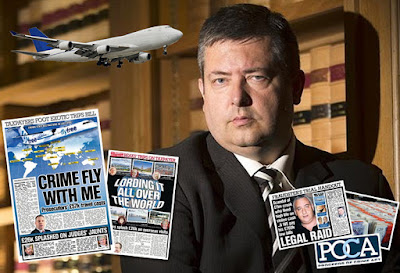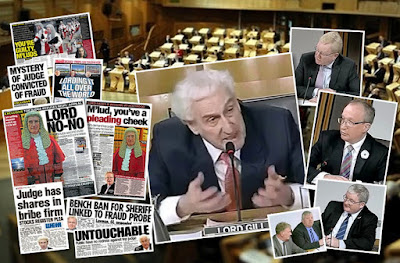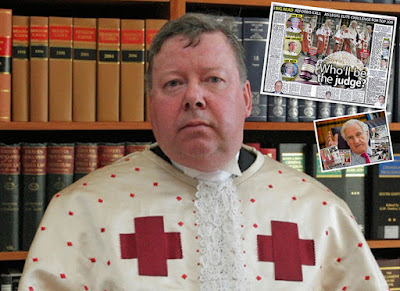 Prosecutors swap court time for international jet travel. SCOTLAND’S Prosecutors based in Edinburgh at the Crown Office & Procurator Fiscal Service (COPFS) - are now spending as much time in the air jetting between international destinations than chasing some of Scotland’s biggest crooks, tax dodgers, gangsters & serial offenders.
Prosecutors swap court time for international jet travel. SCOTLAND’S Prosecutors based in Edinburgh at the Crown Office & Procurator Fiscal Service (COPFS) - are now spending as much time in the air jetting between international destinations than chasing some of Scotland’s biggest crooks, tax dodgers, gangsters & serial offenders.
Figures obtained by the media show the Lord Advocate, Frank Mulholland and his team of staff jetting off to 39 international destinations and choosing air travel over other modes of transport for 143 domestic UK flights – all funded by public cash.
Hong Kong, Mauritius, Taiwan South Africa, Australia, Malta, San Francisco, and New York are listed among the international destinations visited by Crown Office employees on the taxpayer air junket ticket.
The figures (Destination & number of flights) reveal: International flights 2012/13: Albania 2, Amsterdam 10, Brussels 1, Budapest 1, Cape Town 1, Charles de Gaulle 2, Cologne/Bonn 1, Copenhagen 2, Frankfurt 1, Lisbon 2, Luxembourg 4, Malta 1, Pula 1, Rome Leonardo de Vinci 2, Washington Dulles Int 5, 2012/13 Total 36
International flights 2013/14: Amsterdam 12, Basle 1, Brussels 1, Bucherest, Romania 2, Canberra 1, Charles de Gaulle 5, Hobart 3, Krakow 1, Luxembourg 3, Madrid 2, Taipei 1, Vilnius 1, Washington Dulles Int 1, Total 34
UK Domestic flights 2012/13: Aberdeen 2, Benbecula 2, Birmingham 1, Edinburgh 9, Glasgow 8, Inverness - Airport 2, Kirkwall 1, Lerwick, Shetland 1, London City 34, London Gatwick 7, London Heathrow 28, Manchester 2, Total 97.
UK Domestic flights 2013/14: Birmingham 4, Edinburgh 9, Glasgow 6, Inverness - Airport 4, Kirkwall 3, Lerwick, Shetland 14, London City 30, London Gatwick 9, London Heathrow 42, London Stansted 3, Stornoway 5, Total 131
The growing air junket habit at the Crown Office comes after the media exposed a bonus culture racket among Scots prosecutors – revealing Crown Office staff share bonus payoffs of more than £580,000 in just two years.
Yet, every year, the Edinburgh based Crown Office - which costs taxpayers a staggering £112.5 million every year – issues regular press releases claiming hard up prosecutors are busy chasing hundreds of criminal gangs and thousands of unknown gangsters and their ‘professional’ advisers – who hardly ever see the inside of a court room.
Recently the Crown Office has come in for criticism after a number of high profile and expensive prosecution flops which allowed criminals to walk free after prosecutors failed to do their job.
And in a number of cases presented by the Crown Office as successes for justice - a deeper look into the facts of the prosecutions and their outcomes revealed plea bargains and proceeds of crime seizures dwarfed by vast amounts of publicly funded legal aid paid to crooks.
Last week, BBC news reported a Perth drugs dealer had been allowed to keep £300K of his drugs profits - after high flying prosecutors cut a plea bargain deal.
The Crown Office and Lord Advocate Frank Mulholland have also been hit with criticism over their refusal to prosecute the driver of the Glasgow bin lorry tragedy which resulted in six ‘preventable’ deaths.
Another similar case where Prosecutors were criticised for a failure to act involved the deaths of two students, killed by a driver of a Range Rover in Glasgow in 2010. The Crown Office dropped their attempt to prosecute the driver in 2013. Both cases are now the subject of bids to begin private prosecutions.
The Scottish Sun reports:
 CRIME FLY WITH ME: Taxpayers foot exotic trips bill
CRIME FLY WITH ME: Taxpayers foot exotic trips bill
Prosecutors' £57K travel costs
Exclusive:by Russell Findlay Scottish Sun 03/01/2016
PROSECUTORS were blasted for splurging more than £57,000 of taxpayers' cash last year alone flying staff across the globe.
Hong Kong, Mauritius, Taiwan and New York were among 15 exotic destinations visited by Crown Office employees.
And since 2012, they have taken off on a total of 109 international flights to places like South Africa, Australia and Malta.
Yesterday, Tory MSP Alex Johnstone slammed the foreign travel bill as "appalling".
It comes as Finance Secretary John Swinney raised the Crown's budget by £400,000 to £112.5million for this year, despite massive public spending cuts elsewhere.
Mr Johnstone said: "Hard-working Scots will be appalled to learn their cash is going on flying staff out to far-flung destinations.
"If it's not to solve a crime, then they shouldn't be going — there are plenty of conferences and training events in the UK."
He added: "As the SNP are slashing budgets left, right and centre and local courts are closing, this does not represent good value."
The Crown, led by Lord Advocate Frank Mulholland, racked up £29,504 on 39 international flights to meetings and conferences last year and £27,603 on 143 domestic trips.
The number of overseas flights has remained fairly steady over three years at 36, 34 then 39.
But domestic flights have increased sharply from 97 to 131, then 143 last year.
Amsterdam was the most common destination, with 30 trips since 2012. The Dutch city is a major travel hub and close to the International Criminal Court in The Hague. Flights to Washington DC and Malta were in connection with the ongoing probe into the 1988 Lockerbie bombing.
Scottish Labour justice spokesman Graeme Pearson said: "As prosecution services are finding it hard to deliver justice across our shrinking court system, I hope the authorities can justify the costs."
A Crown Office spokesman last night defended the outlay and insisted bosses "strive to provide the best value for the public purse".
He added: "Prosecutors are required to travel abroad in connection with the investigation of cases, in the support of international co-operation and to secure the extradition of individuals who have committed serious crimes.
"It is essential to ensure that Scottish interests are represented at meetings and conferences, which may make decisions which have far reaching consequences for the police, courts and people of Scotland.
"It would be irresponsible not to ensure that representation."
£26K SPLASHED ON JUDGES' JAUNTS
by Russell Findlay
JUDGES sparked controversy last year after we revealed they spent £26,000 of taxpayers' cash on overseas trips.
Top beaks flew out to destinations including Russia, Israel, Switzerland, Germany & France.
The most expensive jaunt was a £5,8000 visit to Canada by Lord Carloway, then Scotland's No2 judge. Lord Gill, the Lord President also spent five days on a £2,800 trip to Doha, Qatar, where he gave a speech on judicial ethics.
It came after he twice snubbed calls to appear in front of Holyrood's public petitions committee just 800 yards from his office.
Legal campaigner Peter Cherbi said: "Judges are supposed to sit in courts, not in jets."
The Judicial Office for Scotland also forked out public money for Lord Armstrong, Lord Boyd and Lady Dorrian to meet other European judges on a three-day trip to Luxembourg.
Lord Eassie travelled to legal events in St Gallen, Switzerland, and Yalta, Ukraine. Lady Clark spent four days in Tel Aviv, Israel, while Lord Hodge went to Paris.
Full details of overseas trips undertaken by Scottish judges are available here: Overseas Travel of Scotland’s Judges 2013-2014 & Judicial overseas trips & expenses claims 2010-2013



